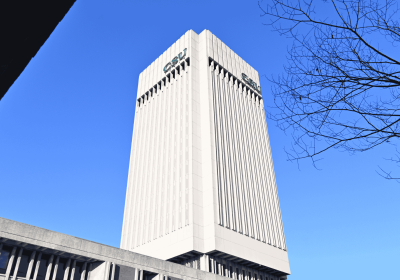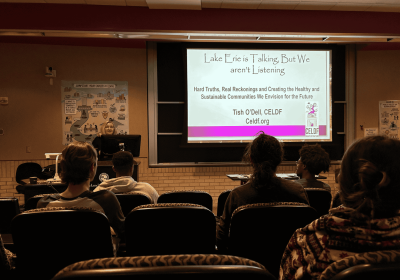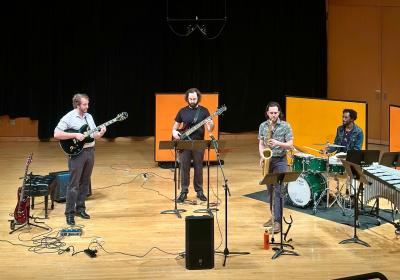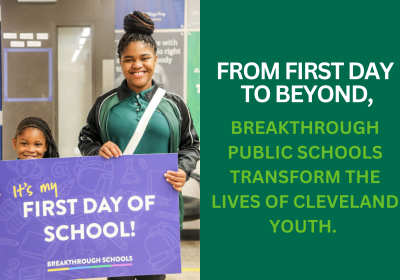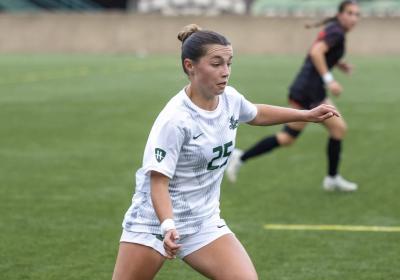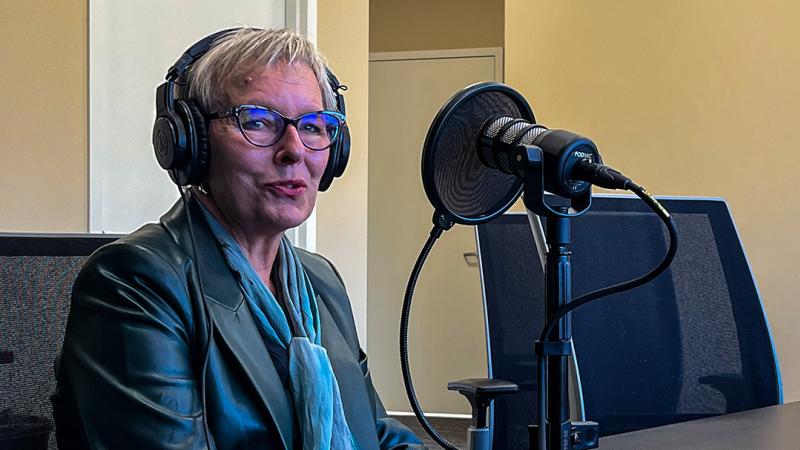
The Stater interview - CSU's President Bloomberg
Cleveland State University President, Laura Bloomberg, Ph.D., discussed plans for student housing, the future of the Wolstein Center, recent concerns with CSU’s letter addressing the Israel-Palestine conflict and more in an interview with the Cleveland Stater on Nov. 2.
Student housing
Cleveland State is notably a commuter-based school, so the future plans to invest in on-campus housing at CSU may be confusing to some.
Bloomberg said that while at one time “almost all students drove in and drove out” of campus, that was at a time when there was a “lack of student campus life.” She explained that is slowly changing and as the university’s reputation grows, more students are indicating a desire to live at CSU and experience campus life.
Bloomberg acknowledged the many living options around downtown Cleveland but said that they are not suitable for students for two reasons. The first is that they are “not cheap” and the second is that the families of first and second-year students, “don’t particularly want them living right downtown.”
The university’s goal is to provide both a safer and more affordable place for students to live close to campus and with easy access to downtown.
“We are proudly an urban campus, but to provide that on-campus housing in those circumstances is ideal,” Bloomberg said.
Bloomberg said that the plan is to grow “campus housing incrementally” to slowly fill dorms and acquire more spaces for students to live as needed, rather than having empty properties all over campus.
CSU’s recent acquisition of the Langston and the Edge are meant to serve as more “independent” living for students, Bloomberg said. However, there is still a lingering requirement for these students to pay for a dining plan, even though their living spaces are fitted with a full kitchen.
Bloomberg addressed that this requirement is “somewhat controversial,” but she said that “it’s not a unique thing to CSU” and that other universities implement similar policies for their on-campus apartments.
Along with CSU’s recent acquisition of The Edge and The Langston, there are also plans to potentially transform Rhodes Tower into dorms.
Bloomberg addressed the concerns of flooding damage, asbestos and outdated heating, ventilating, and air conditioning (HVAC) in Rhodes. She said that transforming the building into student housing would be a “near total internal transformation.”
The plan for these new dorms would be to serve as basic student living with no kitchens and to be offered at a “pretty affordable” price point, Bloomberg said. She also shared that she sees Rhodes Tower as an ideal location to transform into dorms because “the building is iconic” and she thinks “there’s something really powerful” about students living in the tower and “having the best views of downtown.”
Although these plans are not close to being completed, Bloomberg shared her hope for the future of student housing.
“I think that the future is really bright for the options for living on campus and in spending your social life here too,” Bloomberg said.
Plans for the Wolstein Center
Cleveland State’s Wolstein Center is a multifaceted arena intended to host a range of events even outside of the university’s use. As of late, fewer and fewer attendees have filled the stands.
Half of the arena is curtained off for a majority of events held in the space, and the stands still consistently appear to be empty. Bloomberg touched on this topic by emphasizing her belief that low attendance is only sometimes the issue for this emptiness. She believes the space is “too big for the size of (CSU)” and that a downsize is necessary for the Wolstein Center.
“I always use the example of Duke, (which) has a pretty well-known basketball team, and their arena is half the size of Wolstein,” Bloomberg said. “So when their arena looks full, ours would look a lot more like that if it was smaller.”
With the conversation of fewer attendees filling the Wolstein, there have also been discussions surrounding the amount of money it is costing CSU to keep the arena operating.
“People have bounced around this (idea that) we’re losing a million dollars a year,” Bloomberg said. “I think that at times that has been true and at times that has not been true. It sort of depends on how often we’re able to rent the space.”
While she did clarify that the arena is not losing a million dollars every single year, she did say that “there have been times when we have lost one million dollars a year” to operate the space.
Bloomberg said that “it is true” that some acts have not wanted to perform at the Wolstein Center “because of the state of the amenities.”
In terms of the arena’s future, she shared that her personal vision is for it to be “on a different part of campus” and “smaller with more contemporary amenities for people that might want to rent the space.”
All of these visions for the future of the space are not changes that will be seen soon. Bloomberg said that she “can’t promise” immediate changes, but the renovations are included in the multi-year CSU 2.0 master plan.
Criticism of CSU’s Israel-Palestine statement
CSU’s Students for Justice in Palestine (SJP) addressed a public message to President Bloomberg in an Instagram post on Oct. 25. In the post, the student organization expressed their concerns with an email and open letter Cleveland State sent to the university regarding the Israel-Palestine conflict.
SJP were particularly concerned with CSU’s lack of mention of Palestinians within this conflict and how it has left many Palestinian students feeling "unacknowledged and unsafe."
When asked if she had a response to these concerns, Bloomberg said that “the most important thing for me to keep in mind is that people are hurting” and acknowledged that this is a “very complex situation.”
“I am neither Palestinian nor Jewish, so I would never presume to know the depth of the pain, or the depth of this kind of lack of understanding of what an end game could be here,” Bloomberg said.
In the letter addressed to the university on Oct. 13, CSU focused on highlighting campus resources for support to students, faculty and staff. Bloomberg encouraged the campus community to “personally connect” with one another in the letter, and she shared a similar sentiment when asked about the concerns.
“I can’t fix what’s happening in Gaza, as heartbreaking as it is, or in Israel,” Bloomberg said. “But what we can do, and what I’ve urged people to do, is to step away from the news for a moment. Step away from our devices and social media, and find each other’s humanity.”
Cleveland State encouraged anyone in the campus community who is feeling pain from the Israel-Palestine conflict to reach out to CSU’s Counseling Center for further support, and Bloomberg encouraged the use of these resources as well.
“You lose a loved one and the pain is deep,” Bloomberg said. “I don’t think that pain knows a political boundary, and that’s what I want to focus on.”
Ohio senate bill 117
The Ohio Senate passed Senate Bill 117 in June, which required Ohio State University and the University of Toledo to create “intellectual diversity" centers. An amendment subsequently passed to include Cleveland State, amongst other Ohio universities, to also implement these centers for civics, culture and society on their campuses.
During CSU’s first faculty senate meeting of the fall semester on Sept. 13, both Bloomberg and Faculty Senate President Dr. Anup Kumar, Ph.D., said that the university was not consulted about the center prior to its addition to the state budget.
Bloomberg has since created a group of faculty and staff on campus, which she said is tasked with doing two things in relation to Senate Bill 117. The first is to “interpret the bill” and “make recommendations to (Bloomberg)” and CSU’s leadership team in order to “design a center that follows the letter of the law” and also “honors (CSU’s) core mission.”
The second task of the group charged by Bloomberg is to “make recommendations to the board of trustees” as well as the General Assembly for the people who will serve as an “academic advisory committee” to the center. This list of members has to be identified before the end of the calendar year.
Bloomberg explained that until these first steps are completed, she doesn’t “want to do anything else to plan the center until we get those foundational pieces right.”
Division of Student Belonging and Success
At the beginning of the fall semester, CSU launched a new Division of Student Belonging and Success to “realign several existing programs and initiatives” in order to contribute to the ability for “CSU students to thrive no matter who they are, where they are from, or where they are headed.”
This new division includes many existing programs at CSU, such as campus engagement, the counseling center, health and wellness services and many others.
Bloomberg shared that the purpose of creating this new division was to be “focused like a laser on student well-being and success.” She said that there was no intention of replacing any of these existing programs, but instead to “put a lot of things together” for the betterment and ease of access to these student resources.
She said that this work surrounding “equity, inclusion, diversity and multicultural initiatives” is not exclusive to students, and she is growing this for faculty, staff and alumni as well.
One way Bloomberg seeks to instill this initiative in the campus community is through her newly created “President’s Equity Roundtable.” Through these discussions, Bloomberg hopes to “(bring) people together from academics, (human resources), employee groups, students” and more to discuss everything about “equity and inclusion” at CSU.
Conversations on diversity will be a central theme to Bloomberg’s roundtable, but she said that talking "about diversity without talking about equity and inclusion makes no sense to me,” which highlights the importance of the use of “equity” in the title of these conversations.
Getting to know Bloomberg
When asked what she listens to during her morning commute, Bloomberg revealed that she prefers silence.
“I don’t listen to podcasts in the morning because my head goes deep into the podcast,” Bloomberg said. “I often listen to nothing by design, I just drive and think. Sometimes I listen to either jazz or classical music with no words. It’s just a nice way for me to start the day.”
The President was then asked about her go-to Starbucks order, which she said is “really boring.”
“I’m not a frou-frou coffee drinker, I like straight up pike place with an extra splash of cream, nothing else,” Bloomberg said.
Lastly, Bloomberg shared her very first concert experience, which was at an outdoor concert venue in Minneapolis, Minnesota.
“I could go on for an hour about this,” Bloomberg said. “It was three bands in an all-day afternoon outside concert, I think I was 17. It was Pablo Cruise, Steve Miller, and the Eagles, and it was awesome.”]
Final remarks
To end the interview, Bloomberg shared a thoughtful sentiment with CSU’s student media publications.
“I really appreciate student engagement in the media, in our radio programs, in our print news, in the Stater and the Cauldron,” Bloomberg said. “I think it’s essential work. I’ve said this to other students who have interviewed me, none of us really like to talk about uncomfortable stuff, but it’s your job as journalists and it’s my job as your president to answer.”


